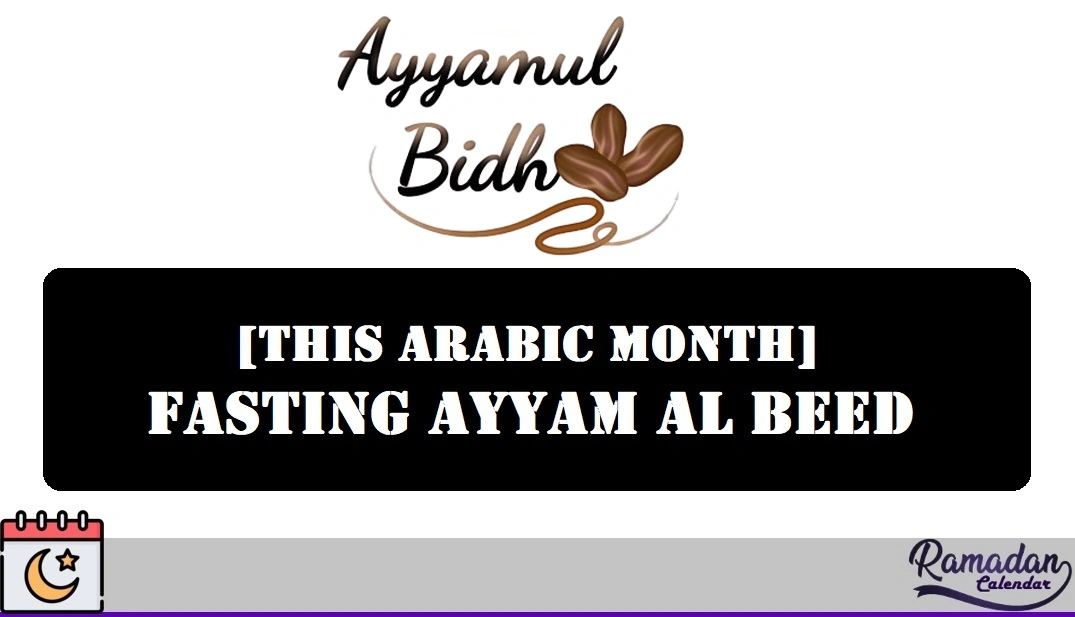Fasting Ayyam al Beed This Month 2026 (Shaban) Saudi Arabia & worldwide
Ayyam al Beed Fasting This Month 2026 (Shaban) Saudi Arabia & worldwide

Fasting Ayyam al-Beed This Month 2026 (Shaban) in Saudi Arabia & Worldwide: Fasting Ayyam al-Beed—the White Days of the Islamic lunar calendar—is a spiritually enriching act of devotion that holds deep significance for Muslims across the globe. In February 2026, these special days fall on the 13th, 14th, and 15th of Shaban in the Hijri calendar, 1447 corresponding to the Gregorian dates of February 02th, 03th and 04th. Observing this Sunnah is an opportunity to strengthen one’s connection with Allah while reaping numerous spiritual, physical, and emotional benefits.
As the new year unfolds, Muslims in Saudi Arabia and worldwide are encouraged to embrace this sacred practice, renewing their commitment to faith and wellness. Whether you reside in the heart of Riyadh, the bustling streets of Jakarta, or the quiet suburbs of London, Ayyam al-Beed fasting is a timeless act of worship that transcends borders and unites hearts.
The Significance of Ayyam al-Beed
The term “Ayyam al-Beed” translates to “The White Days,” referring to the nights when the moon is at its fullest and brightest in the middle of the lunar month. The Prophet Muhammad (peace be upon him) strongly recommended fasting on these days, emphasizing their virtue. In a well-known hadith, the Prophet (peace be upon him) said:
“Fasting three days every month is like fasting for a lifetime.” (Sahih Bukhari, Sahih Muslim)
This profound reward stems from Allah’s mercy and the immense value He places on small, consistent deeds. By fasting these three days, Muslims can achieve spiritual purification, increased taqwa (consciousness of Allah), and exponential rewards for their efforts.
Benefits of Fasting Ayyam al-Beed
- Spiritual Elevation: Fasting trains the soul to exercise patience, gratitude, and self-discipline. By abstaining from food, drink, and other desires from dawn to sunset, a Muslim redirects their focus toward Allah, seeking His pleasure and closeness.
- Physical Health: Modern research highlights the benefits of intermittent fasting, which closely resembles Islamic fasting. It can improve metabolism, aid in detoxification, and promote overall well-being. The three-day fast during Ayyam al-Beed offers a manageable yet impactful way to incorporate these health benefits into one’s routine.
- Emotional Balance: Fasting helps to cultivate emotional resilience by encouraging mindfulness and gratitude. It fosters a sense of empathy for those less fortunate, reminding us of our responsibility to care for others.
- Consistency in Worship: Ayyam al-Beed fasting is part of a broader Sunnah of observing voluntary fasts, such as on Mondays and Thursdays. Engaging in these practices cultivates a consistent habit of worship that strengthens one’s relationship with Allah.
Fasting Ayyam al-Beed in February 2026
In February 2026, Ayyam al-Beed coincides with the winter season in many parts of the world, making it a particularly convenient time to fast. The shorter daylight hours in the Northern Hemisphere mean fewer hours of fasting, which can serve as an encouragement for those who may find fasting challenging.
In Saudi Arabia, the fasting day begins with Suhoor (pre-dawn meal) before the Fajr prayer and ends at Maghrib (sunset). Families often gather for Iftar, breaking their fasts with dates and water, following the Sunnah of the Prophet Muhammad (peace be upon him). Mosques come alive during these days, as communities come together for prayers, Quran recitation, and dhikr (remembrance of Allah).
For Muslims in other parts of the world, the experience may vary slightly based on cultural practices and time zones, but the essence remains the same—a shared devotion to Allah and a commitment to self-purification.
Ayyam al-Beed, or the White Days, for the month of Shaban in 2026 are Monday, Tuesday and Wednesday, February 02, 03, and 04.
How to Prepare for Ayyam al-Beed Fasting
- Set Your Intentions: Sincerity is key to earning the reward of fasting. Begin by making a heartfelt intention to fast solely for the sake of Allah.
- Plan Ahead: Prepare your meals and ensure you have nutritious options for Suhoor and Iftar. Focus on foods that provide sustained energy, such as whole grains, fruits, and protein-rich dishes.
- Stay Hydrated: Drink plenty of water during non-fasting hours to stay hydrated throughout the day.
- Involve Your Family: Encourage your household members to join you in fasting. Share the rewards and blessings as a family, making it a collective act of worship.
- Engage in Worship: Enhance your fasting experience by increasing your acts of ibadah (worship).Pray extra Sunnah prayers, recite the Quran, and make dua (supplications).
Encouraging Others to Participate
As we prepare for Ayyam al-Beed fasting, let us also inspire others to join in this noble act. Share the significance of these days with friends, family, and community members. Utilize social media platforms to spread awareness, sharing reminders and motivational messages.
In addition, local mosques and Islamic organizations can organize community Iftar gatherings to create a sense of unity and encouragement. Such initiatives not only foster a spirit of brotherhood but also make the experience more fulfilling.
Final Thoughts
Fasting Ayyam al-Beed is a beautiful Sunnah that offers immense rewards, both in this world and the Hereafter. It is a chance to purify our souls, draw closer to Allah, and experience the transformative power of fasting. In February 2026, let us seize this opportunity with sincerity and enthusiasm, joining millions of Muslims worldwide in this shared act of devotion.
Whether you are a seasoned observer of Ayyam al-Beed fasting or embarking on this practice for the first time, remember that every step taken for Allah’s sake is a step toward His mercy and blessings. Let us make these days count, renewing our faith and reaping the rewards of this cherished Sunnah.





